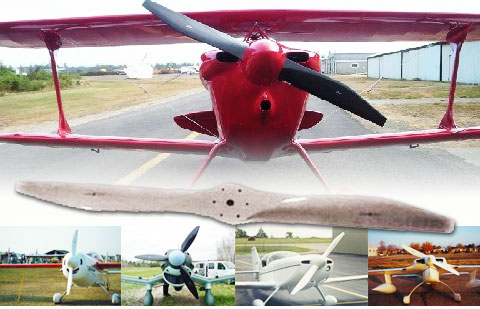Prince Aircraft Company P-Tip Props
 |
||||||||||||||||||||||||||||||||||||||||||||||||||||||||||||||||||||||||||||||||||||||||||||||||||||||||||||||||||||||||||||||||||||||||||||||||||
| Prince P-tip props are the only wood / composite anti-vortex droop tipped propeller in the world. This propeller is a wood, fixed pitch propeller that relies on the forward pull of the propeller to automatically provide pitch change proportional to the amount of force being applied to the propeller disk. When a propeller operates at a slower airspeed than its maximum capabilities, it has a proportional pull in relation to the velocity of forward motion. At takeoff and climbing condition the propeller has its largest forward pull, due to the scimitar shape. The tip of the propeller cones forward, as the coning angle changes the propeller will lessen pitch providing shorter takeoffs and higher rates of climb. As the propeller increases in forward speed the disk pressure is reduced, forcing the propeller to increase pitch and top speed. This change in pitch is approximately 4“ from takeoff to cruise. The droop P-TIP delays the vortices. The propeller then has smooth air to provide better thrust and a pronounced reduction in propeller noise. Additional benefit of the P-TIP design is the volume of air the propeller produces. When air flows through a standard tip propeller design the airflow at the tip will flow over the propeller tip, as soon as it passes the tip it will tuck down behind the propeller blade giving a cone of air from the propeller smaller than the propeller diameter. A 68” P-TIP will give the same volume of air as a standard tip 72” propeller. By reducing propeller diameter there is less frontal area or flat plate drag of the aircraft, higher top speeds are the result without sacrificing takeoff or climb. | ||||||||||||||||||||||||||||||||||||||||||||||||||||||||||||||||||||||||||||||||||||||||||||||||||||||||||||||||||||||||||||||||||||||||||||||||||
|
||||||||||||||||||||||||||||||||||||||||||||||||||||||||||||||||||||||||||||||||||||||||||||||||||||||||||||||||||||||||||||||||||||||||||||||||||
WOOD
P-TIP PROPELLER |
||||||||||||||||||||||||||||||||||||||||||||||||||||||||||||||||||||||||||||||||||||||||||||||||||||||||||||||||||||||||||||||||||||||||||||||||||
Before the "Carbon Fiber P-TIP Propeller", this had been considered one of the most efficient and lowest noise propellers available; the only wood/carbon fiber anti-vortex droop tipped propeller in the world. This propeller is a wood, fixed pitch propeller that relies on the forward pull of the propeller to automatically provide pitch change proportional to the amount of force being applied to the propeller disk. When a propeller operates at a slower airspeed than its maximum capabilities, it has a proportional pull in relation to the velocity of forward motion, so at takeoff and climbing condition the propeller will have its largest forward pull. Due to the scimitar shape, the tip of the propeller cones forward, as the coning angle changes the propeller will lessen pitch that provides shorter takeoffs and higher rates of climb. As the propeller increases in forward speed the disk pressure is reduced, this forces the propeller to increase pitch and top speed. This change in pitch is approximately four inches from takeoff to cruise. The droop P-TIP is to control the air spillage over the propeller tip that delays the tip vorticies which cause drag and turbulence within the propeller arc. A propeller, like a wing, works best when it has unturbulated air over the airfoil sections. The P-TIP delays the vorticies, the propeller then has smooth air to provide best thrust and a pronounced reduction in propeller noise. Additional benefit of the P-TIP design is the volume of air the propeller produces. When air flows through a standard tip propeller design, the airflow at the tip will flow over the propeller tip. As soon as it passes the tip it will tuck down behind the propeller blade giving a cone of air from the propeller smaller than the propeller diameter. For example, a 72" diameter propeller without a P-TIP will give a volume of air from the propeller of approximately 68" of diameter; a P-TIP propeller will provide 72" of air volume. This means that a 68" P-TIP will give the same volume of air as a standard tip 72" propeller. By reducing propeller diameter there is less frontal area or flat plate drag of the aircraft. Higher top speeds are the result without sacrificing takeoff or climb. Your benefit is a lightweight, pitch changing propeller that will give you the best of short takeoff, maximum cruise, and more flying enjoyment in a quieter cockpit. |
||||||||||||||||||||||||||||||||||||||||||||||||||||||||||||||||||||||||||||||||||||||||||||||||||||||||||||||||||||||||||||||||||||||||||||||||||
COMPOSITE
P-TIP PROPELLER |
||||||||||||||||||||||||||||||||||||||||||||||||||||||||||||||||||||||||||||||||||||||||||||||||||||||||||||||||||||||||||||||||||||||||||||||||||
| Composite P-Tip Props retain the same qualities of the wood
P-TIP but are more efficient and durable. Prince uses the reliable time
proven wood core of hard maple, then completely encloses the blades in
multiple layers of high tensile strength composites. The hardwood core
absorbs the dangerous harmonic vibrations and benefits your airframe by
smoothing the engine power pulses, and the composite wrapping allows the
airfoils sections to be thinner, reducing drag while increasing durability
and locks each blade into operating at precise angles. The best working
propeller is one that is rigid enough to allow all blades to move alike,
thin at the cord section to eliminate as much drag as possible, and strong
enough to satisfy the large amounts of stress required during flight. Urea
Formaldehyde adhesive meets Military Specifications to insure reliable operation
and trouble free flying for the life of the propeller. Propellers are finished
in a metal prop gray color, this shade will match nearly every paint scheme,
the Durability and Ultrahigh Gloss finish is a two-part Urethane, machine buffed to achieve a propeller that reflects the quality of manufacturing like no other propeller available. |
||||||||||||||||||||||||||||||||||||||||||||||||||||||||||||||||||||||||||||||||||||||||||||||||||||||||||||||||||||||||||||||||||||||||||||||||||
APPLICATION CHART |
||||||||||||||||||||||||||||||||||||||||||||||||||||||||||||||||||||||||||||||||||||||||||||||||||||||||||||||||||||||||||||||||||||||||||||||||||
|
||||||||||||||||||||||||||||||||||||||||||||||||||||||||||||||||||||||||||||||||||||||||||||||||||||||||||||||||||||||||||||||||||||||||||||||||||
CALL FOR PRICING |

 Aircraft Spruce Australia
Aircraft Spruce Australia